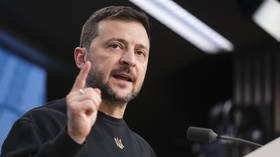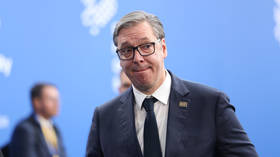ROAR: “Russia has not lost compatriots”

The third World Congress of Russian Compatriots held in Moscow should strengthen social and cultural ties with Russian-speaking people living abroad.
Almost 500 delegates from 90 countries gathered at the congress. Some 30 million Russians currently live abroad, three quarters in the former Soviet republics of Ukraine, Belarus and Kazakhstan.
Speaking at the congress, President Dmitry Medvedev said protecting the rights and interests of Russians abroad was a priority for Moscow. Violations of compatriots’ rights “should not be left unattended in Russia,” he said.
Medvedev also stressed that Moscow will support organizations of compatriots and veterans in their fight against manifestations of Nazism and xenophobia in different countries.
Among the concrete steps that should follow soon, the president mentioned a plan to establish a foundation for assistance and rights protection for compatriots living abroad. Russian human rights NGOs overseas may get Moscow’s assistance, and a network of Russian science and culture foundations abroad will be developed, he said.
Amendments to the Federal Law on Russian public policy towards compatriots abroad are being prepared.
Medvedev also noted that the government program to assist the voluntary resettlement of compatriots in Russia would be changed. So far, more than 17,000 people and their families have come back to Russia. More than 20 Russian regions have programs or plans for working with Russians living abroad, Medvedev said.
“Dmitry Medvedev is modernizing compatriots,” Kommersant daily said. He urged them “to return to the motherland and take part in the modernization he had declared” and promised assistance “according to our current capabilities,” the paper said.
Congresses of compatriots are held once every three years. The main result of the previous gathering that took place in St Petersburg in 2006 was “advancing process of consolidation of the foreign community, building the organizational structure and Diaspora ties,” Russian Foreign Minister Sergey Lavrov said.
“The Russian world is disunited, atomized, and the very idea of consolidating is very important, said Vyacheslav Nikonov, Executive Director the Russian World Foundation. The congress is working for the consolidation, he told Rosbalt news agency.
The participants are discussing “ideas and new interesting projects that could be supported by the state,” Nikonov said. One of the most important problems is the fate of Russian-speaking schools abroad, he said, adding that “they will not develop without the state’s assistance.”
Nikonov believes that another priority is working with governments of different countries to support Russian-speaking education there. He also stressed the importance of the issues of “establishing and developing the Russian Diaspora and organizations abroad.”
Over the last 10 years, a lot has been done to support Russians living abroad, said Aleksey Ostrovsky, chairman of the State Duma’s committee for the CIS and relations with compatriots. The federal agency to support compatriots, the Russian World foundation and other organizations has been established, he told Vesti TV channel.
Despite supporting Russians living abroad being one of the state’s priorities, Ostrovsky said, private companies should also take part in this work. Companies working abroad “should participate in assisting compatriots who live there,” he said.
The problems of Russians living in different countries are not similar, but the common theme is the issue of defending their rights and interests as national minorities,” said Stanislav Yepifantsev, a member of the World coordination council of Russian compatriots.
He believes it is still difficult for many people to build “partnership relations” with Russia because in the past many organizations have thought Moscow should support “any projects, “including questionable ones.”
Another major problem is the preservation of the Russian language, Yepifantsev told BaltInfo news agency. It seems that the countries that emerged after the Soviet Union’s break-up “participate in the competition” to see who will limit more the use of the Russian language. All these states continue “to vow with a nice smile to have a strategic partnership with Russia, while playing their own national cards,” he said.
“Attacks against the Russian language are politically-motivated,” Yepifantsev said, explaining that they are used every time “when another additional leverage in talks with Russia is needed.”
At the congress in Moscow, the issue of “a compatriot’s card” is also being discussed. Many organization of Russians living abroad have spoken in favor of introducing such a card, but Yepifantsev said it is a question what benefits this card could bring and how it would be used.
Another major issue is the problem of voluntary resettlement to Russia. Many have pinned their hopes on the state’s program, which could let compatriots know that “Russia is remembering them and is waiting for them,” BaltInfo said. But the low number of those who have resettled in Russia “demonstrates the disappointment,” it added.
“Some people are frightened by bureaucratic obstacles, others have not found an attractive region to move to,” the agency said. Many have not solved the housing issue, which remains the most acute one. The world financial crisis has aggravated all the problems and decreased capabilities of the programs, it added.
However, many still believe that Moscow could do more to help compatriots to return to Russia or support them abroad. “The program of resettlement has failed,” Gazeta.ru website noted in its editorial. According to the previous plans, 50,000 Russians were expected to return in 2007, 100,000 in 2008 and 150,000 in 2009, the website said, adding that so far only 17,000 compatriots have used this program.
Russians are not in a hurry to resettle because “they are not certain that the state will support them,” Gazeta.ru said. “Moreover, the program offers resettlement to selected, not very attractive regions, including the Far East,” it added.
The authorities have decided to correct the program by the year’s end, increasing the number of regions participating in it, the website noted. “But it is clear that thousands of those who resettle will not turn into millions,” it stressed.
“Even more so, one should not expect that Russian scientists will start to return from abroad,” the website said, adding that big money is needed for such ambitious projects.
Many analysts think that now Russia should concentrate more on consolidating the Diaspora abroad. Patriarch of Moscow and All Russia Kirill echoed this view at the congress, stressing that the compatriots should preserve their cultural and national identity. “Diaspora should not be of second rate because many judge the country by its Diaspora.”
For the purpose of preserving cultural identity it is necessary to open centers of the Russian language abroad, including those based on the parishes of the Russian Orthodox Church, he said.
“The fact that people live outside Russia does not mean that the country has lost them,” Patriarch Kirill said. Now the face of the Russian Diaspora “does not look satisfactory,” he added. “There is no consolidation, and it is necessary to work on this,” he stressed.
Sergey Borisov, RT













